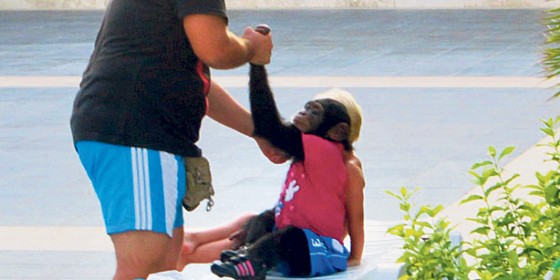 Hotels and photographers along Turkey’s tourism-heavy southern coast are reportedly exploiting chimpanzees and other wild animals for profit — but Turkish authorities say they can’t put a stop to it.
Hotels and photographers along Turkey’s tourism-heavy southern coast are reportedly exploiting chimpanzees and other wild animals for profit — but Turkish authorities say they can’t put a stop to it.
For the past several years, various international animal rescue groups have received complaints from tourists in Turkey, who say that their hotels offered guests the chance to take their photograph next to a posed chimpanzee. Since 2007, the World Society for the Protection of Animals has received at least twelve such complaints, and a Dutch primate rescue group, the AAP Rescue Centre for Exotic Animals, has heard of a few such cases as well. Most of the reports came from tourists in the cities of Alanya and Antalya.
But an official from the Ministry of Environment has declared this type of exploitation the fault of private photographers, not the hotels where the photographers find their customers, making it difficult to prosecute or prevent such cases in the future.
Tourism-related animal exploitation: a worldwide problem
The WSPA wildlife adviser tasked with the case of the Turkish hotels told English-language daily Today’s Zaman that he’s encountered the same excuse before. “This was the same excuse I got from hotels when I investigated a similar situation in Spain many years ago,” Watkins said.
Chimps and other wildlife are usually smuggled from Africa to countries with large tourism industries, such as Spain and Turkey. Although an international organization, CITES, exists to regulate the passage of wildlife across national borders, few actual cases of trafficking are prosecuted or brought to light by the group, Green Prophet’s Tafline Laylin found in an interview with Karl Ammann earlier this year.
In Spain, according to Watkins, most animals used by tourist photographers are smuggled out of their home country as babies and disposed of – usually killed – after just three or four years, when they start to become aggressive.
Turkish hotel owners willfully ignoring the issue
Turkish law expressly forbids personal ownership of primates. When Turkish authorities visited the hotels where complaints had been made, they found no evidence of chimpanzees being exploited, and deferred blame to the photographers.
Watkins rejects the Turkish environmental ministry’s excuse that photographers, not hotel owners, are the only culprits in these situations. Allowing the photographers to ply their illegal trade on the hotel’s premises implicates the hotel as well, he points out, and exposes tourists to any diseases the animals might be carrying.
“The hotel management is allowing an illegal activity to take place in their hotel when they allow the photographers to bring the chimps into their hotel. It is very clear that the hotels are getting some money from allowing the photographers to do business on their property,” said Watkins.
Easy solutions
By refusing to allow wild animals on the premises, hotels in Turkey could ensure that no such exploitation took place, Watkins says.
In the meantime, the Turkish government could take a more aggressive stance against the problem by monitoring the hotels about which tourists have complained, or making random visits. The government has shown its consideration for wildlife in the past, building “green bridge” crossings for wild animals over highways in parts of the country with heavy traffic.
Hopefully, Turkey will follow Lebanon’s example, and take the hardest line it can against animal abuse.
Read more about animal abuse in the Middle East:
Boycott Wine Until Vineyard No Longer Animal Deathtrap?
Interview: Illegal Wildlife Trafficking With Karl Ammann
Abuse of Circus Animals in Lebanon Challenges Lack of Legal Framework
Image via Today’s Zaman



